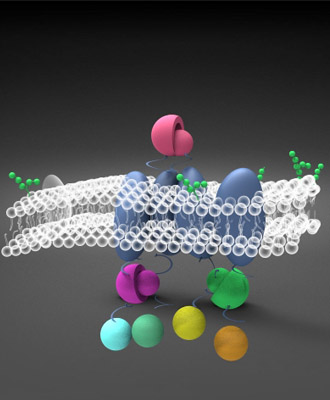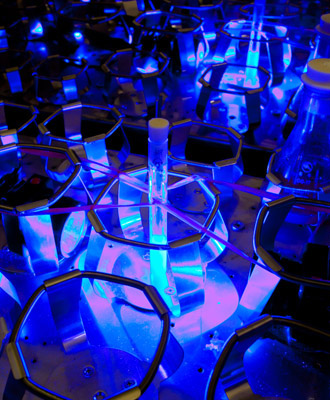Team:SJTU-BioX-Shanghai
From 2012.igem.org
Huanan1991 (Talk | contribs) |
AleAlejandro (Talk | contribs) |
||
| Line 653: | Line 653: | ||
<p>This year, SJTU-BioX-Shanghai iGEM team is trying to build a “factory” on E.coli’s membrane, where enzyme assemblies can be manipulated so that biochemical reactions can be accelerated and further controlled. </p> | <p>This year, SJTU-BioX-Shanghai iGEM team is trying to build a “factory” on E.coli’s membrane, where enzyme assemblies can be manipulated so that biochemical reactions can be accelerated and further controlled. </p> | ||
| - | <p>We aimed at constructing a set of protein | + | <p>We aimed at constructing a set of protein assemblies on E.coli cell membrane as carriers of various enzymes. Distinct from previous synthetic scaffold system, our device limits the reaction space to a two-dimensional surface. In such system, the membrane functions as an extensive scaffold for proteins to anchor without limitation of scaffold amount. More strikingly, we can switch direction of enzymatic reactions through external or internal signals with our device. </p> |
| - | <p>By gathering downstream enzymes through interacting protein domains, the reaction can be accelerated sharply. Production of | + | <p>By gathering downstream enzymes through interacting protein domains, the reaction can be accelerated sharply. Production of fatty acid was enhanced by more than 24 fold through recruiting our membrane accelerator system, which has a promising application prospect in biofuel production.</p> |
| - | <p> | + | <p>In ''Membrane Rudder'' device, we successfully changed the direction of Violacein synthetic pathway through light signal. </p> |
</div> | </div> | ||
</td> | </td> | ||
Revision as of 22:25, 26 September 2012
|
Abstract: This year, SJTU-BioX-Shanghai iGEM team is trying to build a “factory” on E.coli’s membrane, where enzyme assemblies can be manipulated so that biochemical reactions can be accelerated and further controlled. We aimed at constructing a set of protein assemblies on E.coli cell membrane as carriers of various enzymes. Distinct from previous synthetic scaffold system, our device limits the reaction space to a two-dimensional surface. In such system, the membrane functions as an extensive scaffold for proteins to anchor without limitation of scaffold amount. More strikingly, we can switch direction of enzymatic reactions through external or internal signals with our device. By gathering downstream enzymes through interacting protein domains, the reaction can be accelerated sharply. Production of fatty acid was enhanced by more than 24 fold through recruiting our membrane accelerator system, which has a promising application prospect in biofuel production. In ''Membrane Rudder'' device, we successfully changed the direction of Violacein synthetic pathway through light signal. |
|
 "
"


